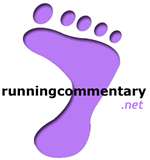"Running Free" - Richard Askwith
"Run Wild" - Boff Whalley
To my way of thinking there are two basic types of running: running for fitness, and/or running for pleasure. I say "and/or" because obviously running for pleasure also has a spin-off benefit of fitness as well. It is this second form of running - running for its own sake, for the sheer pleasure of it, that Askwith and Whalley are both trying to sell in their books. Both decry the recent rampant commcercialisation of the sport, and long to get runners up into the mountains and across the green fields of old England, free of lycra, devoid of GPS and without a sponsor's name in sight, all of which they feel add layers of separation from the runner and the environment in which they run. Which is all well and good, and both writers do a fair job of promoting their version of the sport. However, both also suffer from excessive negativity in lambasting what for most of us is going to be the form of running we most often undertake - the pounding of pavements in the cities and suburbs where we live, and the treading of mills in gleaming gyms. They particularly foist vitriol on the big city marathon, the very thing which is the goal; the very motivation of many an urban-dwelling runner. Whalley puts it rather bluntly:
"
City marathon running is an expression of our fear of the unknown and our willingess to collaborate in our own confinement. Marathon running celebrates the thrill of mass participation, but at a cost of losing our sense of our place in the world."
This is a view which fails to properly understand that goal-driven running can and generally is a pleasurable and immensely worthwhile undertaking. Askwith and Whalley's rejection of the commercialisation of running is at best confused and misguided, as if major brands are somehow responsible for what they perceive as the misery of runners and their injuries, a view which is both very wrong and rather cruel in its delivery. Askwith's and Whalley's motivation is genuine enough - they sincerely want runners to cast aside the materialism of "Big Running" (as Askwith calls it) and to really connect with the landscape and thus experience running at an exhilarating new level, rather than just perservere through a training session for the end goal alone. Unfortunately, in doing so they rather clumsily attack the very thing that most of us are stuck with, and with which we do the best we can, finding sufficient joy and genuine pleasure from it to make Askwith and Whalley's assertions seem, well, rather foolish. Despite their claims to mediocrity as runners, both men are clearly excellent runners. Both have completed the
Bob Graham Round, putting them in a very exclusive club of elite fell runners. As such, their claims to understand what makes us lesser mortals tick must be treated with a degree of skepticism.
At the end of the day, Askwith and Whalley, who appear to be something of a mutual admiration society, have essentially written the same book. Askwith writes rather better, but Whalley is the more interesting character, and so both books are therefore still worth a read, but neither book holds a candle to Askwith's first mighty effort, "Feet In The Clouds", or Christopher McDougall's famous "Born To Run" to which they both pay homage.
Worth a read, but treat with caution.




